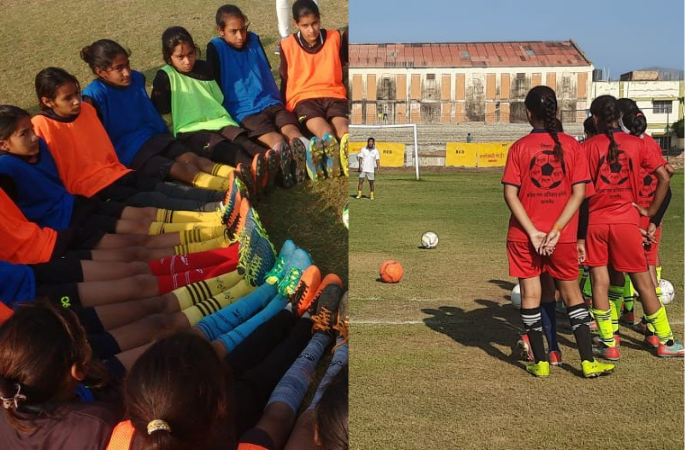Ajmer Girls are Rewriting the Rules of Patriarchy through Football
A group of adolescent girls from rural Rajasthan are moving the goalposts against patriarchy. In our world, where the dreams and aspirations of young girls are often limited, these girls fight the system together, creating a space for their goals.
Even with opportunities, women and girls are proscribed from availing it. From a young age, they are burdened with the responsibilities of the entire household, with no time for themselves and their dreams.
Even today, some communities strongly believe that girls are not meant to acquire education and should contribute only towards household chores. These girls score goals against this mindset by playing football at the national level.
Young girls from Hansiyawas, Chachiyawas, Meeno ka Naya Gaon and Sakariya villages of Kekri block, which is 30-40 kilometres from Ajmer, were brought together by an organization called Mahila Jan Adhikar Samiti (MJAS) in 2016. A football team was formed that started playing on September 15, 2016. Today, some of these girls have made their place on the national football team.
“There were many hurdles in the beginning. We come from a place where girls are restricted from following their dreams. It was difficult to even think of sports, let alone participate in it,” said Pinky Gurjar, a football team member.
According to her, the villagers could not find any reason to play football and were against their interests. Moreover, they believed that playing football would “spoil” these girls and make them shameless!
The indomitable spirit of these young girls persuaded their parents. As a result, they have ‘allowed’ their daughters to play, but not without carrying the extra burden of being a girl in this world. “I complete all my household chores before I step out to play so that parents have no reason to scold me,” informed Pinky.
Seeing her friends play this sport, Sapna from Hansiyawas village got inspired to join the team. “I wanted to break the misconception that football is a men’s game. I want to make my identity as a footballer,” said a fearless Sapna who believes that football has helped her in her personal growth as well. “We are no longer fearful of stepping out of the house, no longer hesitant to speak our opinion. As our courage and confidence has grown, we have started to question what is wrong,” expressed Mamta.
Mothers of these girls have supported them to pursue their dreams against the pressure from the villagers. Footballer Sapna’s mother, Kishni Devi, said, “Since childhood, I was also interested in sports. As girls’ participation in sports was considered to be wrong, I could not fulfil my dreams. I will not allow this to happen to my daughter.”
Sapna is not the only girl who is living her mother’s dream. Footballer Pinky’s mother, Laali Devi, is also proud of her daughter. “She excels in sports as well as in studies,” said Laali Devi, whose parents never allowed her to study or play and restricted her to the household chores. She was married as a child and was sent to her in-laws, which shattered her dreams. Not wanting the same life for her daughter, Laali encourages and supports her daughter to follow her own path. Football is nurturing these girls to realise their mothers’ dreams and come out of the trap of illiteracy and child marriages.
Rajasthan, a traditionally patriarchal society, has a meagre female literacy rate. According to the Census of India (2011), female literacy stands at 52.12 %, staying far below males, which is 79.19 %. According to a report, Rajasthan has the most significant gender divide of 23.2 % in terms of literacy rate. The state also witnesses more instances of child marriages than other parts of the country.
Ajmer based organisation MJAS works towards the overall development and empowerment of women and girls in this district and its nearby villages. This women-led, rights-based organisation provides these girls with an opportunity in sports. “Girls here live in fear and terror because of the social environment and the centuries-old traditions like child marriages. So they are hesitant to even speak. The organisation, through this initiative, is trying to unveil their talent and introduce them to football, which is still considered to be a men’s sport,” shared Indira Pancholi, the secretary of the organisation.
The initiative received excellent resistance not just from the villagers but also from the schools. They wanted to keep the girls away from anything that involved running. However, the efforts of the organisation and the persistence of these girls made them withdraw.
Despite the resistance and hurdles, these young footballers are moving ahead in life. In 2019, Monika Gurjar, Mamta Gurjar and Kanchan Gurjar went to Bhilwara to participate in a district level tournament in which they secured the fourth position. In the same year, they were selected for the National level tournament in Odisha. However, they could not participate as the tournament was called off due to some misunderstanding between the organising committee members.
These three girls and their whole team were also invited to play as a guest team at the ‘Sports For Change’ initiative under the HCL foundation in Noida in 2019. They were then asked to play at the National level under the same initiative held in Lucknow. Everyone was happy and proud of their achievement, but the Covid-19 pandemic affected their further plans to some extent.
However, post lockdown, another member of the team- Suman Gurjar and Mamta Gurjar went to participate in a district-level tournament held in Bhilwara in October. After the tournament, both these girls were selected for the Rajasthan Senior Women’s Football team. The team is now all set to participate in the National Football Championship (Under 18) in Kunnur, Kerala, which began on November 28 2021, to be held till December 9 2021. As time has gone by, the number of MJAS girls participating at the national and state levels has grown exceedingly.
Initially, there were a total of eighty girls from all four villages. Today, the number is more than a hundred. In Hansiyawas, it started with thirty girls, and now fifty girls are part of the team from this village. Likewise, in Chachiyawas, girls playing football increased from twenty to forty. Over two hundred and fifty girls are currently training from coach Sudhir Joseph. Three days a week, they travel to Ajmer to the Patel Stadium and three days, they get training in their respective villages. They leave for Ajmer at seven in the morning and return at eleven. In their village, they practice from five in the evening for one and a half hours. The travel arrangements are taken care of by MJAS.
There is a change in the perception of villagers. Today, they encourage the girls to play football and support all the related activities. Panchayats have made arrangements for a playing field and kits. MJAS organises football training in Ajmer. Playing football has made these girls benefit from several government schemes. This has allowed them to pursue higher education. One girl has received a scholarship of Rs. 50,000. These girls are rewriting the game rules and moving forward, defending and attacking to win their freedom through football!
This article is written by Pooja Gurjar, currently in the first year of graduation. A resident of Hansiyawas, Pooja advocates for equal rights for girls and women. She has completed a course on Grassroots Journalism organised by MJAS.
- This article was sourced from ‘Charkha Features’ Charkha works towards the social and economic inclusion of marginalized communities in remote and conflict areas through the creative use of media. Many of these areas are highly inaccessible and socially, economically and politically unstable.



